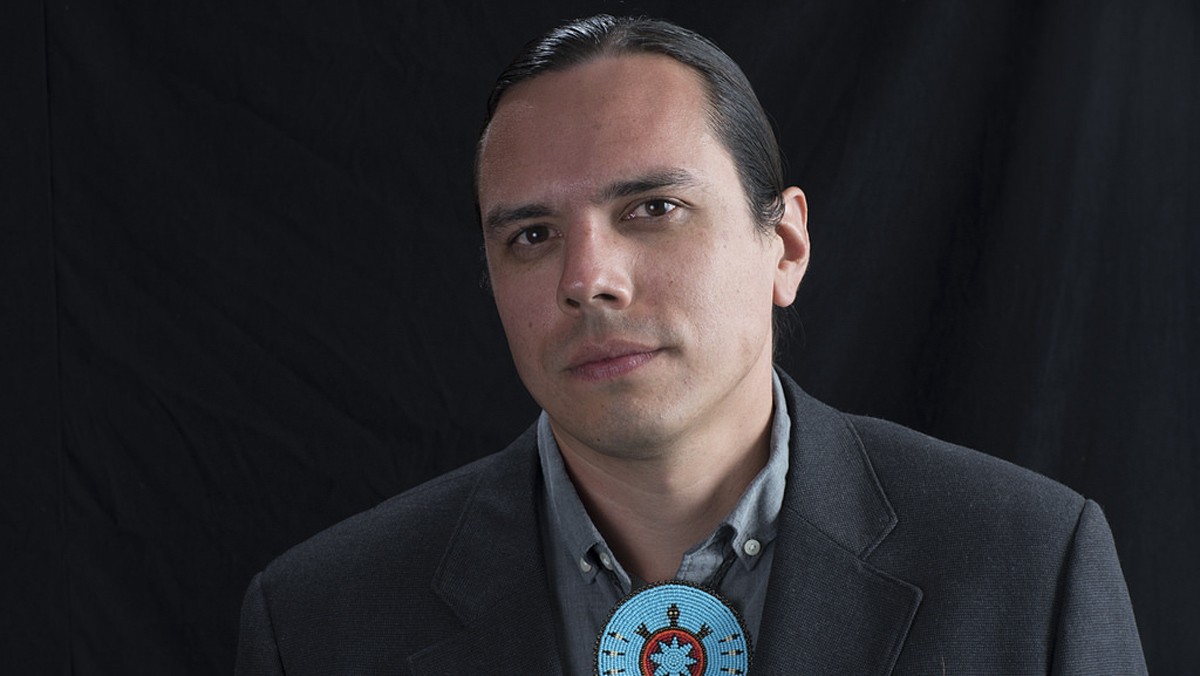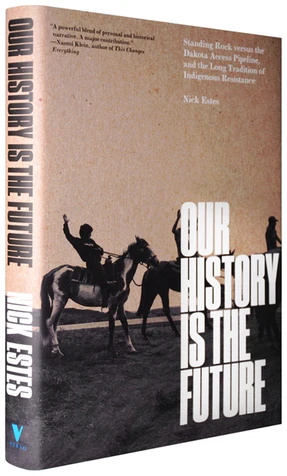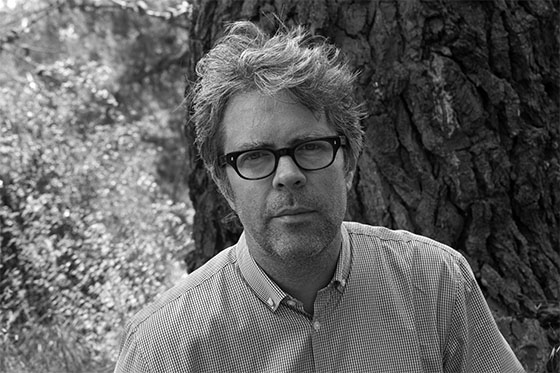Utah Award in the Environmental Humanities
2024-Dr. Nick Estes
Dr. Nick Estes is the sixth recipient of the Utah Award in the Environmental Humanities
The University of Utah’s Environmental Humanities Graduate Program will award Dr.
Nick Estes, noted historian who focuses on global Indigenous histories, environmental
justice and decolonization with the 2024 Utah Award in the Environmental Humanities
on October 1, at 7:30 pm in the University’s Alumni House. After conferring the award, members of the Environmental Humanities Program will
engage in a conversation with Estes about the relationships between his work and environmental
humanities. The event is free with registration and open to the public. 
The Utah Award in the Environmental Humanities celebrates environmental leadership and expression. The award was created to honor those who solve the planet’s environmental problems using humanities tools like creative expression, popular art forms, scholarly research or advocacy. Past recipients of the award have been Amitav Ghosh, Rebecca Solnit, Jonathan Franzen, Aniya Butler, and Greg Sarris.
Nick Estes is an enrolled member of the Lower Brule Sioux Tribe and is an Assistant Professor in American Indian Studies at the University of Minnesota. He studies colonialism and global Indigenous histories, focusing on decolonization, oral history, U.S. imperialism, environmental justice, anti-capitalism, and the Oceti Sakowin.
Estes is the author of the award-winning book Our History Is the Future: Standing Rock Versus the Dakota Access Pipeline, and the Long Tradition of Indigenous Resistance (2019), which places the Indigenous-led movement to stop the Dakota Access Pipeline into historical context. He co-edited with Jaskiran Dhillon Standing with Standing Rock: Voices from the #NoDAPL Movement (2019), which draws together more than thirty contributors, including leaders, scholars, and activists of the Standing Rock movement, for a reflection of Indigenous history and politics and on the movement’s significance.

Estes was the American Democracy Fellow at the Charles Warren Center for Studies in History at Harvard University (2017-2018), the Lannan Literary Fellow for non-fiction (2019), and a Marguerite Casey Foundation Freedom Fellow (2020-2021). He is a National Archives Distinguished Scholar at Boston University (2022-2023).
Estes co-hosts The Red Nation Podcast and is the lead editor of Red Media, an Indigenous-run non-profit media organization that publishes books, videos, and podcasts. Estes is also a member of the Oceti Sakowin Writers Society (formerly Oak Lake Writers Society), a network of Dakota, Nakota, and Lakota writers committed to defend and advance Oceti Sakowin sovereignty, cultures, and histories. He is also an award-winning journalist whose writing has been featured in the Guardian, The Intercept, Jacobin, Indian Country Today, The Nation, NBC News, The Funambulist Magazine, High Country News, and the New Yorker.
Dr. Greg Sarris, author, scholar, teacher, and Chair of the Federated Indians of Graton Rancheria, is the fifth recipient of the Utah Award in the Environmental Humanities
The University of Utah’s Environmental Humanities Graduate Program will award Dr. Greg Sarris with the 2023 Utah Award in the Environmental Humanities. Sarris, Distinguished Chair
Emeritus of Native American Studies at Sonoma State University, Chair of the Federated Indians of Graton Racheria, and Chair of the Board of Trustees of the Smithsonian Museum of the American Indian will receive the award on Tuesday, September 19 at 7 pm in the university’s Alumni
House. After conferring the award, members of the Environmental Humanities Program
will engage in a conversation with Sarris about the relationships between his work
and environmental humanities. The event is free and open to the public. 
The Utah Award in the Environmental Humanities celebrates environmental leadership and expression. The award was created to honor those who solve the planet’s environmental problems using humanities tools like creative expression, popular art forms, scholarly research or advocacy. Past recipients of the award have been Amitav Ghosh, Rebecca Solnit, Jonathan Franzen, and Aniya Butler.
Greg Sarris received his Ph.D. in Modern Thought and Literature from Stanford University, where he was awarded the Walter Gore Award for excellence in teaching. He has published several books, including Grand Avenue, an award-winning collection of short stories, which he adapted for an HBO miniseries and co-executive produced with Robert Redford. He is serving his sixteenth consecutive elected term as Chairman of the Federated Indians of Graton Rancheria. In addition to serving as Chairman of his Tribe, he serves as President of the Tribe’s Economic Development Board, overseeing all of the Tribe’s business interests, including the Graton Resort and Casino. Formerly a full professor of English at UCLA, and then the Fletcher Jones Professor of Creative Writing and Literature at Loyola Marymount University, Greg now holds the title of Distinguished Emeritus Graton Endowed Chair in Native American Studies at Sonoma State University, where he taught a number of courses in Creative Writing, American Literature, and American Indian Literature. His book How a Mountain Was Made, a collection of stories was published in October 2017 and was awarded a Bronze Medal from Independent Publisher Book Awards. His book Becoming Story: A Journey among Seasons, Places, Trees, and Ancestors was released in April 2022. He is executive producer of I Am A Noise, a Joan Baez documentary film, appointed as Chair to the Board of Trustees for the Smithsonian National Museum of the American Indian, Co-Chair of Smithsonian Campaign, and elected to the American Academy of Arts and Sciences. Governor Newsom appointed Greg to the University of California Board of Regents in June 2023.
Activist Aniya Butler is the fourth recipient of the Utah Award in Environmental Humanities

The University of Utah’s Environmental Humanities Graduate Program will award youth climate activist, poet and environmental justice organizer Aniya Butler with the 2022 Utah Award in the Environmental Humanities. Butler, a 15-year old, Black climate activist and anti-racism advocate from Oakland, CA, will receive the award on Tuesday, March 22, 2022 at 6 pm in the university’s Alumni House. The event is free and open to the public.
Butler’s work with Youth Vs. Apocalypse and her climate strike activism focus on broadcasting the previously silenced voices of people of color and of youth. Butler models an intersectional approach to activism that connects climate change, literature and social justice. Her work inspires diverse communities to recognize their power and act in a world that has told them to be silent.
“Butler’s work contributes to the growing momentum of environmental justice in America,” said Jeffrey McCarthy, director of the Environmental Humanities program. “This award will acknowledge the voice of a teen and thus advance Aniya mission of making the next generation heard.”
The Utah Award in the Environmental Humanities celebrates environmental leadership and expression. The award was created to honor those who solve the planet’s environmental problems using humanities tools like creative expression, popular art forms, scholarly research or advocacy. Past recipients of the award have been Rebecca Solnit, Amitav Ghosh and Jonathan Franzen.
“This year, it is especially satisfying to celebrate a young person at the beginning of her important, inspiring work for justice,” said McCarthy.
Acclaimed American essayist and novelist Jonathan Franzen is the 2020 recipient of the Utah Award in the Environmental Humanities. 
The Environmental Humanities Graduate Program at the University of Utah invites the public to celebrate Jonathan Franzen’s environmental accomplishments on March 4, 2020 at the Nancy Tessman Auditorium at the Salt Lake City Main Library at 7:00pm.
Franzen’s environmental essays have stirred audiences on the subjects of climate mitigation, the importance of birds, interspecies ethics, and human resilience in a changing world. Jonathan Franzen has been an outspoken voice for the environment in his fiction and non-fiction across five novels and five works of non-fiction including The Corrections, Freedom, and The End of the End of the Earth.
"Bringing a writer of Jonathan Franzen’s status to campus is a rare opportunity for our students and for the broader community", says Jeffrey McCarthy, Director of the Environmental Humanities Program. "We are especially excited to underline the important environmental contributions Franzen has made with his essays and his novels. This award is the world’s first prize in the field of environmental humanities. It celebrates our recipients while putting their goals in the spotlight. It also puts the U on a national stage, and further distinguishes our Environmental Humanities Graduate Program."
The Utah Award in the Environmental Humanities celebrates environmental leadership and expression. The $10,000 award honors those who solve the planet’s environmental problems using tools of the humanities, such as creative expression, scholarly research, popular art forms and advocacy.
The University of Utah honors writer and historian Rebecca Solnit with Award in Environmental Humanities
 |
|
Photo Credit : Trent Davis Bailey |
The University of Utah’s Environmental Humanities Graduate Program awarded writer, historian and activist Rebecca Solnit with the Utah Award in the Environmental Humanities, Thursday, March 28 at 7 p.m. in the Salt Lake City Main Library. You can watch a recording of the evening event here.
Known for her books about feminism, western and indigenous history, popular power, social change and insurrection, wandering and walking, hope and disaster, she’s also a contributor to The Guardian and other news publications. She’s written 20 books including The Mother of All Questions, Hope in the Dark, Men Explain Things to Me, The Faraway Nearby, A Paradise Built in Hell: The Extraordinary Communities that Arise in Disaster, A Field Guide to Getting Lost, Wanderlust: A History of Walking and River of Shadows: Eadweard Muybridge and the Technological Wild West (for which she received a Guggenheim, the National Book Critics Circle Award in criticism and the Lannan Literary Award).
“The students in the Environmental Humanities Program admire Solnit’s work and efforts in these urgent political times,” said Jeff McCarthy, director of the Environmental Humanities program. “The award celebrates work that engages environmental issues from the perspective of the humanities, has a broad impact and speaks to diverse communities. Solnit’s work embodies these values.”
The $10,000 award is an annual celebration of environmental leadership and expression and honor those who solve the planet’s environmental problems using the tools of the humanities such as creative expression, scholarly research, popular art forms and advocacy.
“The award is the first of its kind and it foregrounds the power of cultural responses to environmental crises,” said McCarthy. “This work is especially important right now. Our graduate program trains the next generation of environmental leaders to be activists, artists and academics.”
The Environmental Humanities Graduate Program, housed in the College of Humanities, aims to produce an interdisciplinary, intellectual and creative space in which students are prepared to reflect on what it means to be human, encouraged to be creative and collaborative and to think about new forms of environmental leadership and stewardship.
“Our students come from around the world to study in the American West with committed faculty, impressive field stations and full-fellowships. They leave with jobs in non-profits, careers in the arts and positions in excellent doctoral programs and professional schools,” said McCarthy.
Environmental Humanities Graduate Program Will Award Indian Novelist Amitav Ghosh
with the Inaugural Utah Award in the Environmental Humanities
 The University of Utah’s Environmental Humanities graduate program will award Indian
novelist Amitav Ghosh with the inaugural Utah Award in the Environmental Humanities on Monday, March 26
at 7:00pm at the Salt Lake City Main Library.
The University of Utah’s Environmental Humanities graduate program will award Indian
novelist Amitav Ghosh with the inaugural Utah Award in the Environmental Humanities on Monday, March 26
at 7:00pm at the Salt Lake City Main Library.
“We are thrilled to bring an environmental thinker of Amitav Ghosh’s status to campus,” said Jeff McCarthy, director of the Environmental Humanities program. “His writing imagines new tools for collaborative living in a new climate.”
The $10,000 award will be an annual celebration of environmental leadership and expression and honor those who solve the planet’s environmental problems using the tools of the humanities such as creative expression, scholarly research, popular art forms and advocacy.
“The award is the world’s first prize in the field of environmental humanities. It celebrates and validates the recipients while putting their goals in the spotlight. It also puts the U on a national stage, and further distinguishes our environmental humanities graduate program,” added McCarthy.
Recipients of the award will travel to Salt Lake City for a public reception, give a lecture about the role of the environmental humanities and engage with students, faculty and the community. Ghosh will visit the U campus in March 2018.
Ghosh has written ten novels and several books of non-fiction including 2016’s “The Great Derangement: Climate Change and the Unthinkable.” Ghosh’s work has been translated into twenty languages and published in myriad outlets including The New Yorker, The New Republic and The New York Times. His writing focuses on environmental consciousness in the most difficult circumstances of a multi-cultural, globalized and interdependent world.
Since 2006, the environmental humanities graduate program housed in the College of Humanities has been training the next generation of leaders to become academics, activists and artists for the causes they care most about.
“Our students come from around the world to study in the American west with committed faculty, impressive field stations and full-fellowships. They leave with jobs in non-profits, careers in the arts and positions in excellent doctoral programs and professional schools,” concluded McCarthy.

